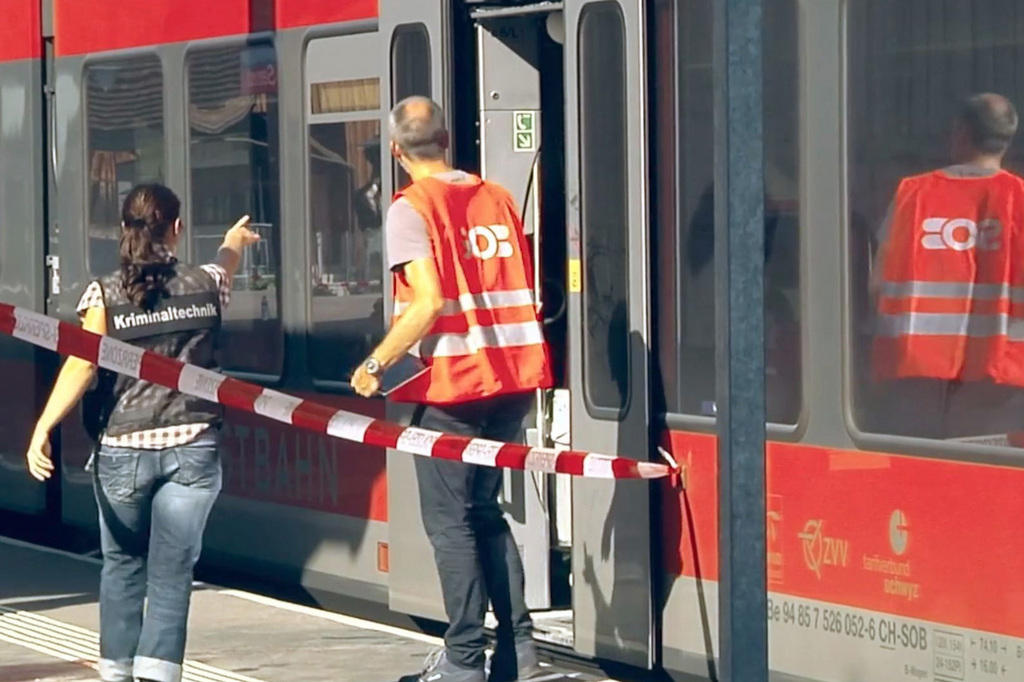
Why no name for train attacker?

The name of the person believed responsible for a deadly attack on train passengers in northeastern Switzerland has not been released. Here are the reasons why.
So far, Swiss police have provided the age, gender and nationality of the attacker – a 27-year-old Swiss male. No further information has been released to the media. This is common practice in Swiss law enforcement, designed to protect the privacy of an individual and the person’s family.
Journalists are also asked to respect such privacy guidelines. A handbook of best practices published by the Swiss press council states that the public’s right to information must be carefully weighed against the right to privacy. In general, “reporting a person’s identity is allowed if the affected person is a public figure in the matter being reported on, having assumed a role of political or social leadership”.
The handbook gives an example: a Swiss newspaper published the name of a financial advisor who had mismanaged clients’ money. Following a legal complaint that the paper breached privacy laws by doing so, the editors argued that it was in the public’s best interest to know who this person was so they would not entrust them with their finances. However, the court ruled that it would have sufficed to publish the name of the firm the individual worked for, since the person in question is not a public figure.
Although such a lawsuit is always a possibility if the media overstep their boundaries, journalistic guidelines are just that, and publishers are free to interpret and handle situations as they see fit. Tabloid newspapers and sites, such as Switzerland’s Blick, tend to be among the most liberal in choosing to print individuals’ names. In the case of Saturday’s train attack, the Blick claims to know the identity of the suspect and chose to interpret the guidelines by only publishing the first name and the first initial of the last.
The question of publishing names is further complicated when the international media pick up the story, as other countries operate under different norms. The widespread reporting of a person’s name in the international press can influence Switzerland-based news organisations’ decisions about whether and when to reveal the full identity.
Is nationality relevant?
Another sensitive question related to crime reporting involves the suspect’s nationality and ethnicity. In canton St Gallen, where Saturday’s train attack took place, police reports are legally required to include the suspect’s country of citizenship. That law – the strictest nationwide – has been in place since 2010, when the cantonal parliament directly implemented a popular initiative from the conservative right Swiss People’s Party to that effect.
In arguing for the law, former People’s Party parliamentarian Oskar Freisinger told the Tages-Anzeiger newspaper that “every minority in Switzerland insists on maintaining their cultural identity, but if there’s a crime, suddenly that gets thrown out the window. My nationality is certainly not a private matter.”
The People’ Party has also attempted to require nationwide crime statistics to report nationalities as well as “migration background” for people who became Swiss less than five years previously. An effort to that effect failed in 2010.
However, in canton Zurich, political parties are seeking the opposite: a ban on reporting suspect’s nationalities in police reports. The left-wing Social Democrats, Liberal Greens and Greens argue that doing so leads to stereotypes and generalisations.
“Nationality does not provide any information about a crime,” argued Social Democratic parliamentarian Min Lee Marti in the Tages-Anzeiger. “Today’s practices stoke prejudices and lead the police to suspect foreigners more often.”
As for law enforcement, the national conference of cantonal police directors recommends releasing an individual’s nationality by citizenship in official reports – unless doing so could lead to the discovery of the person’s identity.
What considerations do you think should be made when deciding whether to release a suspect’s name? Let us know in the comments.
Contact the author of this article on Twitter: @vdevoreExternal link

In compliance with the JTI standards
More: SWI swissinfo.ch certified by the Journalism Trust Initiative










































You can find an overview of ongoing debates with our journalists here . Please join us!
If you want to start a conversation about a topic raised in this article or want to report factual errors, email us at english@swissinfo.ch.